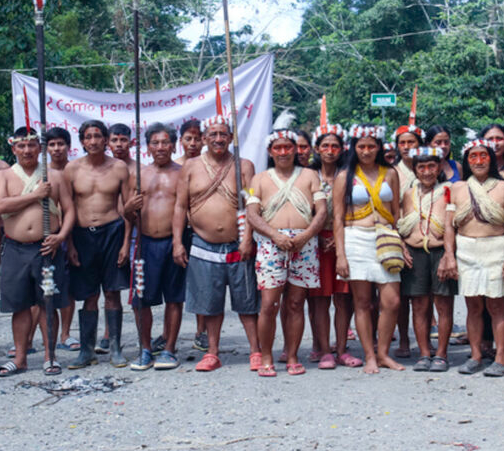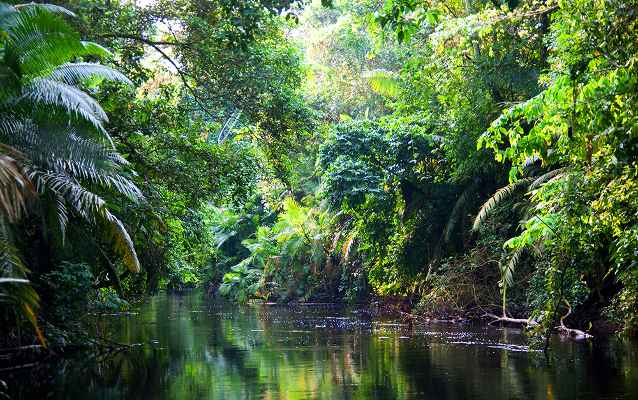Although most indigenous people want to end oil production in Yasuní Park, some support it
By Fernando Goya
Although most of Ecuador’s indigenous community supports a “yes” vote in a referendum to end oil production in the Amazonian Yasuní National Park, a group of Waorani women staunchly oppose it. In fact, they plan to bar environmental activists supporting the referendum from entering their ancestral lands in the Amazon region, where an oil field located.
“We will not allow Koori (foreigners) to enter,” group leader Felipe Emma said, expressing the position of the group, which includes seven women from the Kawimeno community and supports the extraction of oil from the nearby Ishpingo field.

Members of the Waorani community in the Amazon are divided about a referendum that would end oil production in the Yasuní National Park.
They are fighting a battle against the environmental group Yasanidos, which has been campaigning for a decade-long referendum to ban oil drilling.
In May, the Constitutional Court of Ecuador authorized a public referendum on oil production in the Yasuní, which will be on the ballot in the August 20 election.
With crowns of feathers in head, the women of Kawimeno, accompanied by a spear-wielding warrior holding hands and dancing, gathered at the entrance to the platform of the Ishpingu Alef. The decision to end or continue oil exploitation, Emma said, should be that of “landowners,” not those who don’t belong in the area, including the voting public.
In Ecuador, the constitution recognizes indigenous community land ownership as a form of ancestral organization. However, the state retains control over everything below the ground.
The Ichpingo field together with two other nearby fields, Tiputene and Tambococha, form the so-called ITT Block, or Block 43 which contains 282 million barrels of the South American country’s proven crude reserves for a total of 1.2 billion barrels. Production in the two adjacent fields began in 2016 after years of heated debate over whether to drill inside Yasuní National Park.
This came after then-President Rafael Correa’s government failed to convince the international community to pay Ecuador $3.6 billion not to exploit the ITT block, protecting the Amazon and helping to limit global warming. Environmentalists claimed Correa was insincere from the beginning, knew the plan would fail, and that his intention was always to begin drilling.
A year later, in 2014, activists blamed Correa for pressuring the national elections council to reject signature petitions that would have forced a public referendum vote on preserving the Yasuní. Based on opinion polls, it is widely believed that the referendum would have passed by a wide margin.
Today, the ITT area produces 57,000 barrels per day, a major part of Ecuador’s total production of 464,000 barrels.
The Yasuní National Park, a biosphere reserve home to about 2,000 tree species, 610 bird species, 204 mammal species, 150 amphibians and more than 120 reptile species, according to the University of San Francisco in Quito.

A river in the Yasuní National Park. Biologists say the park is one of the most biodiverse areas on earth.
The Waorani, who belong to the Kauemeno people, live about a four-hour walk and boat ride from Ichepingo, near the Peruvian border. These 400 residents have announced that they support oil extraction, the revenues of which compensate for the absence of government services. “Without oil, we wouldn’t have access to education, health and family care,” says Panenke Huabi, the village head, many of whose residents work in the oil sector.
In addition to being among the most biodiverse areas on Earth, the one-million-hectare (2.5-million-acre) Yasuní National Park is home to two of the last uncontacted indigenous communities. It also has oil fields that started being exploited before the ITT blockade, the Waorani women say.
Early polls show strong support for ending oil production and exploration in the Yasuni. “We see how the extraction operations have besieged Yasani for many years, since the 1970s, when the oil began to be exploited,” said Pedro Bermio, a lawyer and spokesman for the Yasunidos collective. “Now it’s time to end the exploitation.”
But the referendum also created deep divisions among the Waorani themselves, with some, like the women supporting oil production, while most appear to support ending it. The Waorani, with a total number of 4,800, own approximately 800,000 hectares of forest in the departments of Orellana, Pastaza and Napo.
In 2019, Pastaza’s Waorani got a court ruling banning oil companies from entering in a area of 180,000 hectares of their land.
But in the Ispingo Alef district of Orellana, “we will continue to work because the black gold is used to build cities, pay teachers, education, health care and everything else,” says Akau Yetebe, an oil worker from Waorani.
The Ecuadorian state oil company, Petroecuador, has obtained permission to work on approximately 300 hectares of Yasuni Park within its ITT block. It has so far exploited about 80 hectares, which has generated $4.2 billion in revenue for the state, about $1.2 billion in 2022 alone.
“If the ‘yes’ vote wins to end production, the losses will be enormous,” said Ramon Correa, director of Petroecuador. The losses to the national treasury, he says, could be as high are estimated in $1.4 billion annually.
___________________
Credit: AsumeTech




















